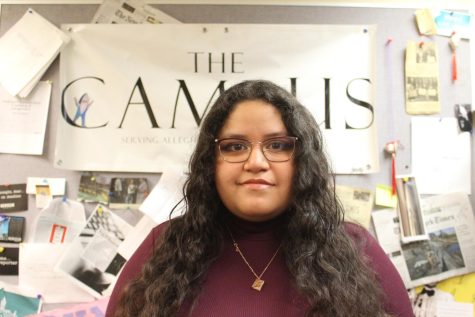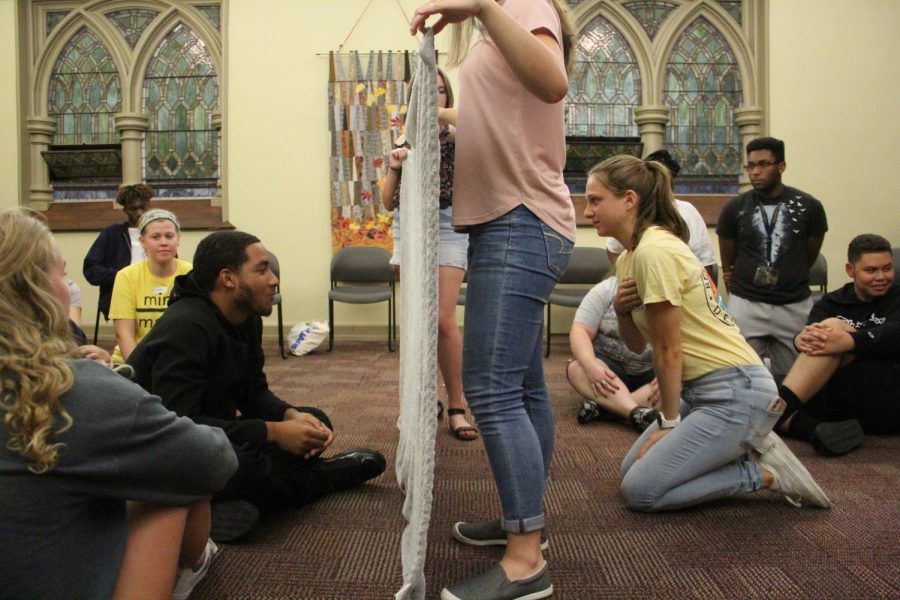Changes across campus as health guidelines loosen
After over a year of COVID-19 restrictions, Allegheny College has started the process of returning students back to a more normal semester. With full capacity dining, access to in-person religious services and no masking requirements, students have more opportunities to build community on campus with their peers.
Stephanie Lang, general manager for Parkhurst Dining, discussed changes made to the experience in McKinley’s Food Court and Brooks Dining Hall.
“McKinley’s last year was fully mobile ordering with two pick-up points,” Lang said. “We got tons of feedback from students saying they missed seeing our team members and they missed seeing the food. We changed the setup to be partially in-person and partially mobile.”
While Brooks seating returned to full capacity, the dining structure did not go back to how it was prior to COVID-19 restrictions. A new and improved system was put in place.
According to Lang, Brooks is not approved by ACHA to be all-you-can-eat or self-serve. That is not the only reason why Brooks did not return to how it was before COVID-19. Dining services took the opportunity to completely change dining at Allegheny. Through feedback they were able to make significant changes.
“Prior to COVID, Brooks got a lot of hate,” Lang said. “Brooks got a lot of hate about people touching things, fingers in food, really unsafe food practices. Brooks is a point system now. We make changes based on 100% student feedback and permission from ACHA.”
The seating has been a big change because McKinley’s and Brooks can seat more people since both have gone back to being at full capacity. Each location provides different experiences.
“I love Brooks for the reason that, unlike McKinley’s, is a very communal space where you sit with your teammates, friends, sorority and fraternity,” Lang said. “It builds community that we were really lacking last year. This year we were really intentional about bringing that feeling back that Brooks always has.”
The quality of the food has been improved as well.
“We’ve been able to train our team a bit better,” Lang said. “We are still desperately short-handed as everyone in our industry is right now, so we are just doing our best with training and keep learning. You will see more changes in Brooks as we have our growing pains.”
Along with changes to the student dining experience, religious services went back to normal hours of operation. Many places of worship were limited or closed altogether last year, so students are excited to be able to gather in places of worship together again and have access to Ford Chapel and the Prayer and Meditation House when they need to.
President of the Newman Association William Nese, ’23, shared his thoughts on how the changes will benefit Catholic students on campus who need the Ford Chapel for more than one day a week.
“The private time for people to pray was especially limited. Some people didn’t know that Mass was even offered,” Nese said. “This year we will get to see more people again now that everyone’s on campus doing more usual activities and just continuing to collaborate. Now that COVID is lessened, I think there’ll be more opportunities.”
Director of Muslim Life Sami Alkyam remarked on the difference the opening of the PAM house will make for Muslim students on campus.
“We do not have any limitations so students can be there and do their meditation prayers,” Alkyam said. “We are limited by a specific number of students, but that’s not an issue because we are small groups anyway. Last year, we could not gather together much in person.”
Alkyam explained the benefits many Muslim students gain from being able to practice their faith together, especially during the month of Ramadan.
“In April, we were lucky enough to get an exemption and start meeting in-person because we had entered the month of Ramadan, the month of fasting for Muslims, and it was hard for students because for some of them it was the first time they had been away from home during that month,” Alkyam said. “Every single day in April we ate dinner together after sunset. I can’t tell you how happy I was to see how much students appreciated it at the end of the month.”
With masks no longer required this semester, students can start to engage more socially.
“The facial engagement you get from looking at the faces of your classmates and colleagues was missing last year,” Alkyam said. “I have heard students now complementing each other this past Friday, saying they never imagined them looking this way.”
The semester will continue to be monitored to ensure its safety as more changes are implemented and students return to a more normal year.

Evelyn Zavala is a senior from San Francisco. She is majoring in Business and minoring in Journalism in the Public Interest. This is her fourth year on...

Sami Mirza is a senior from many different places. He is majoring in International Studies with a focus on the Middle East and North Africa and minor in...









